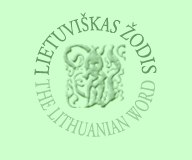Jonas Juska (1815-1886), educator
and linguist was born in Zarenai, county of Telsiai.
In 1844 he graduated from the University of Kharkov, where he studied
classical languages and later taught them at several gymnasiums (high
schools) in Russia.
From 1858-1863 he served as an inspector of the Russian Cadet Corps.
His request to be given a teaching position in Lithuania was denied by
the governor-general of Vilnius because his brother, Rev. Antanas
Juska, stood accused of having had connections with the insurrection
of 1863. While employed in the school system Juska applied himself to
the study of problems of teaching, producing a number of essays that
earned the praise of officials in the ministry of education. The
remainder of his time was devoted to research in the Lithuanian
language.
J. Juska evinced interest in the scientific study of Lithuanian since
1852, having made the acquaintance of the Russian academician. I.
Sreznevsky and later that of the Polish linguist J. Baudouin de
Courtenay, professor at the University of Kazaní from 1875-1883. In
that same city Juska taught at school from 1875-1886.
Juska came into additional contact with problems of Lithuanian
linguistics when he collaborated with his brother in publishing a
collection of Lithuanian folk songs and a dictionary of the Lithuanian
language.
After his brotherís death in 1880, the Russian Academy of Science
entrusted Juska with preparation of the final draft for publication
after taking account of comments by the Russian linguist A. Potebnia.
He put much effort into the execution of this task.

